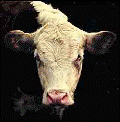Animal Science, Department of

Department of Animal Science: Dissertations, Theses, and Student Research
Date of this Version
Fall 4-23-2010
Document Type
Thesis
Abstract
This research was conducted to understand the effects of feeding finishing diets containing distillers grains on beef quality. In the first and second studies, feeding wet distillers grains plus solubles (WDGS) increased proportions of PUFA, omega 6, omega 6/omega3, and trans fatty acids when compared to corn (P ≤ 0.05). Lipid oxidation was higher in muscles from animals fed WDGS when compared to corn (P ≤ 0.05). The third study examined the effects of feeding levels up to 50% of modified distillers grains plus solubles (MDGS) on fatty acid composition in beef. Linear increase (P ≤ 0.05) was observed for PUFA and total trans as levels of MDGS increased in the diet. In the fourth experiment, effects on fatty acid profile of feeding 0 or 40% of WDGS and vitamin E (500 I.U.) were studied. Increased proportions of PUFA were observed in beef from animals fed WDGS. The fifth study examined effects of feeding 35% of WDGS with vitamin E supplementation on lipid and color stability, sensory attributes, and WBSF. Steaks from steers fed WDGS with no vitamin E had higher discoloration and lipid oxidation when compared to steaks from animals supplemented with 1000 I.U. of vitamin E. Feeding WDGS and MDGS increased PUFA, lipid oxidation and decreased color stability of beef. However, supplementation of 1000 I.U. of E mitigated the detrimental effects of feeding distillers grains on color and oxidation. High O2 MAP improved color stability, but a decrease in tenderness was observed when compared to other MAP methods.
Advisor: Chris Calkins


Comments
A DISSERTATION Presented to the Faculty of The Graduate College at the University of Nebraska In Partial Fulfillment of Requirements For the Degree of Doctor of Philosophy, Major: Animal Science, Under the Supervision of Professor Chris R. Calkins. Lincoln, Nebraska: May, 2010
Copyright (c) 2010 Amilton Souza de Mello, Jr.